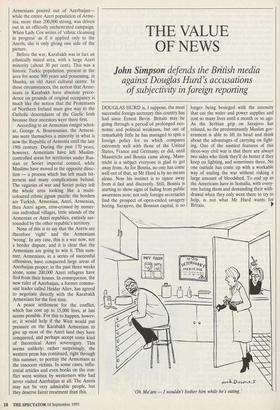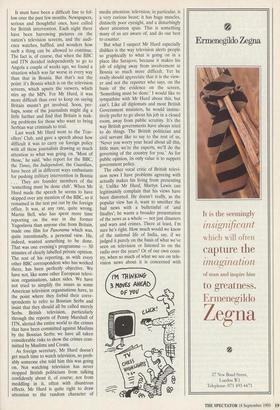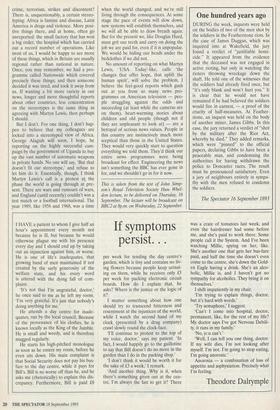THE VALUE OF NEWS
John Simpson defends the British media
against Douglas Hurd's accusations of subjectivity in foreign reporting
DOUGLAS HURD is, I suppose, the most successful foreign secretary this country has had since Ernest Bevin. Britain may be going through a period of prolonged eco- nomic and political weakness, but out of remarkably little he has managed to spin a foreign policy for us which compares extremely well with those of the United States, France and Germany; or did, until Maastricht and Bosnia came along. Maas- tricht is a subject everyone is glad to get away from. As for Bosnia, no one has come well out of that, so Mr Hurd is by no means alone. Now his instinct is to tiptoe away from it fast and discreetly. Still, Bosnia is starting to show signs of fading from public awareness now; not only foreign secretaries find the prospect of open-ended savagery boring. Sarajevo, the Bosnian capital, is no
longer being besieged with the intensity that cut the water and power supplies and cost so many lives until a month or so ago. As the Serbian grip on Sarajevo has relaxed, so the predominantly Muslim gov- ernment is able to lift its head and think about the advantages of carrying on fight- ing. One of the nastiest features of this three-way civil war is that there are always two sides who think they'll do better if they keep on fighting, and sometimes three. No one outside has come up with a workable way of ending the war without risking a large amount of bloodshed. To end up as the Americans have in Somalia, with every- one hating them and demanding their with- drawal when they only went there to try to help, is not what Mr Hurd wants for Britain.
'Oh Ma'am —1 wouldn't bother him while he's eating.' It must have been a difficult line to fol- low over the past few months. Newspapers, serious and thoughtful ones, have called for British intervention. Each night there have been harrowing pictures on the nation's television screens, and the audi- ence watches, baffled, and wonders how such a thing can be allowed to continue. The fact is, of course, that when the BBC and ITN decided independently to go to Angola a couple of weeks ago, we found a situation which was far worse in every way than that in Bosnia. But that's not the point: it's Bosnia which is on the television screens, which upsets the viewers, which stirs up the MPs. For Mr Hurd, it was more difficult than ever to keep on saying Britain mustn't get involved. Soon, per- haps, some of the journalists might dig a little further and find that Britain is mak- ing problems for those who want to bring Serbian war criminals to trial.
Last week Mr Hurd went to the Trav- ellers' Club, and gave a speech about how difficult it was to carry on foreign policy with all these journalists drawing so much attention to what was going on. 'Most of those,' he said, 'who report for the BBC, the Times, the Independent, the Guardian, have been all in different ways enthusiasts for pushing military intervention in Bosnia . . . They are founder members of the `something must be done club'. When Mr Hurd made the speech he seems to have skipped over any mention of the BBC, so it remained in the text put out by the foreign office. It was, at any rate, quite wrong. Martin Bell, who has spent more time reporting on the war in the former Yugoslavia than anyone else from Britain, made one film for Panorama which was, quite intentionally, a personal view. He, indeed, wanted something to be done. That was one evening's programme — 50 minutes of clearly labelled private opinion. The rest of his reporting, as with every other BBC correspondent who has worked there, has been perfectly objective. We have not, like some other European televi- sion organisations, taken sides. We have not tried to simplify the issues as some American television organisations have, to the point where they forbid their corre- spondents to refer to Bosnian Serbs and insist that they should all be called merely Serbs. British television, particularly through the reports of Penny Marshall of ITN, alerted the entire world to the crimes that have been committed against Muslims by the Bosnian Serbs; we have all taken considerable risks to show the crimes com- mitted by Muslims and Croats.
As foreign secretary, Mr Hurd doesn't get much time to watch television, so prob- ably someone else told him this was going on. Not watching television has never stopped British politicians from talking confidently about it, of course; nor from meddling in it, often with disastrous effects. Mr Hurd is quite right to draw attention to the random character of media attention: television, in particular, is a very curious beast; it has huge muscles, distinctly poor eyesight, and a disturbingly short attention span. This is something many of us are aware of, and do our best to counter.
But what I suspect Mr Hurd especially dislikes is the way television alerts people so graphically to what is going on in a place like Sarajevo, because it makes his job of edging away from involvement in Bosnia so much more difficult. Yet he really should appreciate that it is the view- er and not the reporter who says, on the basis of the evidence on the screen, `Something must be done.' I would like to sympathise with Mr Hurd about this, but can't. Like all diplomats and most British Government ministers, he would instinc- tively prefer to go about his job in a closed room, away from public scrutiny. It's the way British governments have always tried to do things. The British politician and civil servant like to say to the rest of us, `Never you worry your head about all this, little man; we're the experts, we'll do the governing of the country for you.' As for public opinion, its only value is to support government policy.
The other vocal critic of British televi- sion news I have problems agreeing with actually makes his living from presenting it. Unlike Mr Hurd, Martyn Lewis can legitimately complain that his views have been distorted. He doesn't really, as the popular view has it, want to smother the bad news with a bulletinful of 'and finallys'; he wants a broader presentation of the news as a whole — not just disasters and wars and crimes. There at least, I'm sure he's right. How much would we know of the national life of India, say, if we judged it purely on the basis of what we've seen on television or listened to on the radio over the years? Or of our own coun- try, when so much of what we see on tele- vision news about it is concerned with crime, terrorism, strikes and discontent? There is, unquestionably, a certain stereo- typing: Africa is famine and disease, Latin America is drugs and violence. More posi- tive things there, and at home, often go unreported: the small factory that has won a big order, the hospital which has carried out a record number of operations. Like most of us, I would be happy to see more of these things, which in Britain are usually regional rather than national in nature. Once, you may remember, we had a pro- gramme called Nationwide which covered precisely these things; and then someone decided it was tired, and took it away from us. If wanting a bit more variety in our news, longer and more thoughtful reports about other countries, less concentration on the stereotypes is the same thing as agreeing with Martyn Lewis, then perhaps I should.
But I don't. For one thing, I don't hap- pen to believe that my colleagues are locked into a stereotyped view of Africa. George Alagiah will soon, I hope, be reporting on the highly successful cam- paign by the government of Uganda to buy up the vast number of automatic weapons in private hands. No one will say, 'But that doesn't fit our stereotype,' and refuse to let him do it. Essentially, though, I think Martyn Lewis's call is a protest at the phase the world is going through at pre- sent. There are wars and rumours of wars, and England (until recently) couldn't win a test match or a football international. The year 1989, like 1956 and 1968, was a time when the world changed, and we're still living through the consequences. At some stage the pace of events will slow down, new systems will establish themselves, and we will all be able to draw breath again. But for the present we, like Douglas Hurd, must grit our teeth and carry on doing the job we are paid for, even if it is unpopular. We would be hiding our heads under the bedclothes if we did not.
No amount of reporting on what Martyn Lewis, 'USA Today'-like, calls 'the changes that offer hope, that uplift the human spirit', will solve the problem. I believe the feel-good reports which gush out at you from so many news pro- grammes on American television — peo- ple struggling against the odds and succeeding (at least while the cameras are on them), heart-warming stories about children and old people (though not if they are unpleasant to look at) — are a betrayal of serious news values. People in this country are instinctively much more sceptical than those in the United States. They would very quickly start to question everything we told them. They'd think our entire news programmes were being broadcast for effect. Engineering the news isn't something the BBC has ever gone in for, and we shouldn't go in for it now.
This is taken from the text of John Simp- son's Royal Television Society Huw Whel- don lecture, to be delivered on Thursday, 16 September. The lecture will be broadcast on BBC2 at 8p.m. on Wednesday, 22 September.




































































 Previous page
Previous page